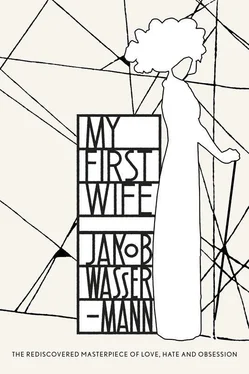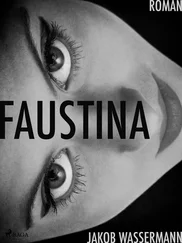ASTONISHMENT IN THE MEVIS HOUSEHOLD
Ganna had promised me she wouldn’t talk about our engagement, but she couldn’t control herself, and after three days everyone knew — her sisters, her mother, her relatives, her acquaintances. Frau Mevis made no secret of her grave doubts. Today I see things differently from thirty years ago; lots of things that were absurd looked all right to me. It was one of the tasteless absurdities of the time that in rich middle-class homes they would speak of misalliances, as if in the upper reaches of the aristocracy. The only person who was kept in the dark was the Professor. Frau Mevis trembled night and day. If he should withhold his consent, hideous scenes were bound to result, and she would be the one to get the blame. She bore some responsibility: she had failed to keep Ganna properly chaperoned. Her fear of her husband, which she had had from the beginning of their marriage, had by and by eroded her personality. She was under as much pressure as a sunken ship, under the water. It’s only a matter of time till the hulk breaks into pieces. The more alert of her daughters had long observed the symptoms of mental illness in her. It was the illness suffered by maybe four-fifths of the women in bourgeois society, the illness of nothing to do, empty representation and constant pregnancies. The day Ganna went to her father to make her confession, and everything inexplicably passed off without éclat , the old lady heaved a deep sigh of relief. ‘I thought he was going to kill her,’ she said to Irmgard and Traude; ‘an author; a man who is nothing and owns nothing. Truth be told, I don’t understand my husband.’ Irmgard reported it to me later.
How the Professor received his daughter’s news calmly and without ire is something for which I have no explanation. For sure, he had read my book. He won’t have taken me for quite such a hopeless and feckless individual as his wife did. But a writer of books with whom one might pass the time of day and an official son-in-law, those are two completely different human categories. Later, with deafening laughter, he assured me he hadn’t believed a single word of what Ganna said to him; he was firmly convinced the fantastical creature was the victim of delusions, and he had first decided to wait to see whether I would turn up at all. ‘Well, and then you turned up,’ he crowed, and whacked me on the shoulder, making all my bones hurt. That gave him away. I could tell how delighted he was to be rid of Ganna. The other girls couldn’t get over their surprise. They said: ‘She’s turned Alexander Herzog’s head, she’s turned Papa’s head, she must have worked some magic.’ In the swans’ terms, working magic was what I felt to be Ganna’s dark Pythian power.
CELEBRATION
I noted down the salient points of my conversation with the Professor in my diary at the time.
‘So you want to marry my daughter?’ he began, once I was sitting opposite him.
‘I don’t really want to,’ I said, ‘Ganna does.’ He looked at me in astonishment.
‘All right,’ he conceded, ‘then let’s just say you have nothing against the idea in principle.’
‘No, in principle.’
‘Then we can move on to the practical side of the question. I assume you are able to provide for a wife.’
‘I’m afraid I must destroy your illusions there, Professor. I can’t even provide for myself.’
‘Admirable honesty. But surely that’s not an abiding inability?’
‘You’re wrong. I see no change in prospect.’
‘Why is that? You are a well-known and much-admired writer.’
‘But I still have no means.’
‘Then what do you live on now?’
‘Tick.’
‘How high are your debts?’
‘Around about 3,000 marks.’
‘That’s not so bad. You’re still young. One day you will become successful.’
‘Possibly so, but that would worry me.’
‘Why so?’
‘It would be a sign that I had compromised. With taste. With the fashion of the day. I don’t want to make any compromises.’
‘An admirable stance. But then how do you envisage a life with my daughter?’
‘To be frank, Professor, I wouldn’t be able to entertain the idea if I hadn’t known she was well-off.’
The Professor laughed in his rackety way. ‘You mean to say that I’m well-off?’
‘Yes, I suppose so.’
‘You’re not afraid of the truth, are you?’
‘That’s my job, Professor. I don’t care about money. I don’t care about a certain standard of living. I want a life with Ganna. It’s my belief that we’re a good fit. But I would have to renounce her if it means I have to work for a living, in the bourgeois sense. Ganna understands that I must be free in that regard. Nor have I come to you to ask for Ganna’s hand in marriage, as the expression goes, though that’s maybe how it appears. I wanted to tell you frankly about my circumstances, because Ganna is utterly convinced that she will only be happy with me.’
‘All right, that’s Ganna. What about you?’
‘I am extremely fond of Ganna. I have very high expectations of her. But for me marriage is not essential.’
‘I understand. But you don’t mean to tell me that you don’t see yourself ever — even many years hence — attaining an income that accords with your gifts?’
‘I don’t think it’s very likely. Not impossible. There are a few instances. The intransigence of a writer is sometimes not an obstacle. But we live in barbaric times, Professor.’
‘I see. I didn’t know that. I had the sense we were living in the lap of a happy, blooming civilization.’
‘I’m afraid that’s an illusion.’
The Professor got up. ‘The interest on the capital sum I am giving my daughter should keep you both from starving. But that’s all.’
‘That’s all we need.’
The Professor extended his hand to me and said warmly: ‘In that case, we seem to be agreed. Welcome to the family.’
That same day he had a brief conversation with Ganna, at the end of which she left the room, laughing and crying with happiness.
NEGRO VILLAGE
Every family is its own hoover. Greedily it sucks into itself the stranger who has been enlisted into it and, inhibited by shyness, tries to resist. After I had met my five future sisters-in-law, my three brothers-in-law, all the various uncles and aunts, the grandchildren, the friends of the house, it took me a long time to sort them all out and remember their various names and titles. It was like a play with a large cast, where you have to keep the programme open on your lap to check who is onstage at any given moment. I forgot that I had a role myself. I had trouble with all this fraternization. I saw no good reason why I should suddenly be on ‘Du’ terms with people I didn’t know from Adam. The automatism with which it was expected that I should astonished me. I learned numerous new customs. Most of what I did or said turned out to be in breach of these. They were supposed to be something sacred, but in the first days and weeks I thought they were more like the customs in a Negro village, and sometimes I had the feeling I was visiting such a village. The whole bustle intimidated me. The meals, the family days, the joint undertakings, the conversations were as noisy as they were arduous. Gradually, I became desensitized. Getting accustomed to something is generally thought of as a blessing, but myself, I’m not sure if it isn’t rather a dulling of the senses and a blunting of the nerves. I was in their eyes a rough-edged individual and they enthusiastically went about filing me down. Eagerly and even a little flattered, they took me into the sacred ring of the family, but at the same time they were a little afraid of my stranger’s ways and accommodated me in a sort of invisible cage, like an exotic beast that is shown to the public for money, no matter how tame it actually is and how little thought it has of running away.
Читать дальше







![Jakob Wassermann - Issue Does Not Exist],errors:{](/books/585068/jakob-wassermann-issue-does-not-exist-errors-thumb.webp)




